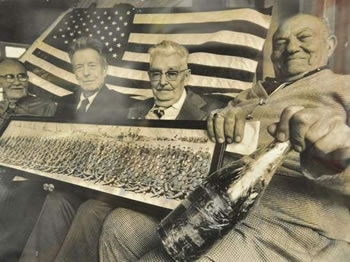 |
 |
 |
 |
Newsletter contact: |
 The history of Barton & Guestier is passionate and rich. Almost three centuries of wines, labels, markets, people and passion...
The history of Barton & Guestier is passionate and rich. Almost three centuries of wines, labels, markets, people and passion...
Please find hereafter the fascinating story about a band of American Veterans' vow to toast fallen comrades with a bottle of Barton & Guestier Sparkling wine…
The text of the article comes from: Marine Corps Times and was published and repeated in many US newspapers and websites.
MEADVILLE, PA. - Once they got home from the Great War, the soldiers of Company B made a vow: They'd reunite yearly and save a trophy of their adventure -a bottle of French wine- until one man was left alive. Then he would uncork the white Burgundy and toast his departed comrades. They called themselves the Last Man's Club. They said they would never forget the French town they liberated in 1918 or the war they fought "to end all wars."
Remembering was easy when World War I was still vivid - when Veterans Day was still called Armistice Day, and the former doughboys would squeeze into their old uniforms and march, a bit more stiffly each year.
But 100 years after an assassination in Sarajevo on June 28, 1914, led to World War I, America's memory of its second-deadliest foreign war is increasingly tenuous.
The nation's last World War I veteran died three years ago. The war's markers and mementos are still there, but fewer and fewer people know what they mean - that York Avenue in New York is named for the Medal of Honor winner Sgt. Alvin York, or that the Charles Stafford American Legion post here is named for one of a dozen members of Company B who never came back.
"Unless you're a quasi-historian, it's a forgotten war," says David Kennedy, whose grandfather kept the Last Man's Club record book.
"What little memory we still have of the war is slipping and fading," agrees Mayor Christopher Soff. "We don't talk about it. We don't learn about it. It's not in our consciousness."
In Europe, the war divides still. For example, a program by Britain's Conservative Party-controlled government to commemorate the centennial has been accused of spilling over into a celebration.
In the USA, the war is overshadowed by World War II, "the good war" fought by "the Greatest Generation." And unlike Korea and Vietnam, which never promised to improve the human condition, World War I was a crusade that even many of its crusaders came to rue.
If it's remembered at all, the war President Woodrow Wilson said was fought to "make the world safe for democracy" is often viewed as a senseless slaughter that set the stage for an ever bigger war two decades later.
At the Meadville high school, Allan Heil's students of American history see in the Senate's refusal after the war to ratify the Versailles treaty or to approve U.S. membership in the League of Nations as an example of the kind of dysfunction currently on display in Washington.
But for better or worse, the war shaped our world, and we forget it at our peril.
"Just look at the Middle East and the Balkans," says John Amato, whose grandfather was a member of the Last Man's Club. "All our troubles there date back to the end of that war."
Just look at Asia, says Kim Holmes, a Heritage Foundation scholar. Isn't there a parallel between a rising Germany's desire to disrupt the international status quo then and a rising China's quest to do the same now?
Just look at daily life, from the inventions of the airliner (which stems from World War I bombers) to the cellphone (traceable to wireless communications developed to keep early observation planes in touch with the ground).
The war brought new medicines and techniques to deal with the carnage on the Western Front; new weapons, including tanks, aircraft carriers, even drones; new songs, like George M. Cohan's Over There. Federal power expanded as the government nationalized the railways, conscripted 3 million troops, read and censored mail and controlled the press - including barring the publication of photos of soldiers' bodies.
The explosion in wartime record-keeping anticipated the national security state's thirst for personal data, and Wilson's call for national self-determination echoes today in every corner of the globe.
The Tomb of the Unknown Soldier at Arlington National Cemetery, dedicated three years after the war, remains a universal symbol of war's cost.
World War I marked the end of several empires and the unofficial beginning of what Time publisher Henry Luce would call "The American
Century." About 2 million doughboys, some of whom had never been out of the county, went over there. After that, says Doran Cart, curator at the National World War I Museum at Liberty Memorial in Kansas City, "everything changed."
When it was over, Americans turned against the war. Wilson's idealism came to seem naïve, and for two decades isolationism enjoyed a last Indian summer. Even then, though, patriotism dictated that those who served not be forgotten and that those who served not forget.
That is why Company B reconvened each year and saved its wine for when the last man would drink it.
It was a popular and poignant notion, especially when the military graves were fresh and poppies had yet to take root in Flanders Fields. Only in Meadville, it didn't quite work out that way.
A war to end all wars?
When war broke out in Europe after the shooting of Archduke Franz Ferdinand of Austria, Woodrow Wilson said America would be neutral "in thought and in deed." He was re-elected in 1916 on the theme: "He kept us out of war."
But in April 1917, angered by Germany's unrestricted submarine warfare on cargo and passenger ships destined for Britain and France, Wilson asked Congress to declare war.
About 150 Meadville men signed up to fight with Company B of the 112th Regiment of the 28th Infantry Division. After training in Georgia in trench warfare, they were sent to Europe and the Western Front, already the greatest slaughterhouse in the history of the planet.
Over the next year, they fought in the bloody battles of Argonne Forest, Chateau-Thierry and Aisne-Marne. In September 1918, they drove a larger German force out of what was left of Fismes, a strategic French rail and river town. The armistice was announced two months later - at the 11th hour of the 11th day of the 11th month.
In 1919, the men reunited in Meadville. Lt. Fred Pond proposed a Last Man's Club like others being formed at the time. For the last toast, he provided a bottle he'd picked up in Paris while on leave.
They met each fall for the next seven decades, always with the bottle present as a reminder.
They had much about which to reminisce. A German bullet had grazed Joe Maggio's forehead. George Chapin had been gassed. David Kennedy was wounded in the shoulder by machine gunfire.
They'd recall the heroism of Pvt. Dan Cozy, who, upon seeing a wounded comrade lying in no man's land, disobeyed orders, jumped out of the trench and was cut down by German fire.
Kennedy kept the club's records in a notebook: names, addresses, phone numbers and, increasingly, dates of death. Rex Woodward passed away on Nov. 17, 1957, a week after that year's reunion. The record book showed $10 allocated for flowers for his widow.
In 1968, for the 50th anniversary reunion, who should turn up but C.W. Honsberger, who'd been living in Front Royal, Va. "We hadn't seen him for 50 years," Cyril Lorz told the Meadville Tribune.
Everyone in Meadville knew their story. When the club held its 1974 reunion at the Mead Inn, other diners sang World War I-era songs as the men walked through the dining room.
Each year, they'd toast the nameless last surviving member - whomever he might turn out to be. But at some point, they amended their plan: Instead of the last man opening the bottle, the task would fall to the last two men.
In later years, their host was Art Cocolin, a World War II paratrooper who had a restaurant downtown. Like everyone else, he was taken by the idea of the club and the bottle.
"That's all they'd talk about - who's gonna outlive who and drink that wine," he says today. "I told them, 'I'd like a slug of that, too' " - just for a taste of history.
The men never lost their connection to Fismes. After World War I, contributions from Meadville and Pennsylvania helped rebuild the bridge over the Vesle River that the Germans destroyed. After World War II, in which Fismes again was destroyed, the city sent three boxcars of relief supplies.
In 1948, the Last Man's Club changed its name to the Societe de Fismes. Meadville and Fismes became sister cities: The Rue de Meadville leads to Fismes' Vesle bridge, and the park in the center of Meadville has a path called the Promenade de Fismes.
Attendance at the reunions steadily declined: 28 in 1967, 17 in 1974, 13 in 1976, six in 1982. By the mid-'80s, when the last reunion was held, four men were there.
"Ken has severe arthritis and is barely able to walk," a relative wrote in 1989 on behalf of Ken Fry, 95, who was living in California. "He sends his wishes to the remaining members." The following year, he died, leaving just two survivors - George Chapin and Joe Maggio.
It was time to drink the wine. But they didn't.
A reminder of camaraderie
Lt. Pond's bottle of Barton & Guestier "Royal Purple Burgundy" from the Macon region, bottled about a century ago, sits on a table in Mayor Soff's office. The tattered, peeling label is held onto the bottle with Scotch tape. The paper seal at the neck is cracked.
For many years, the bottle was in the custody of Kennedy, the record keeper. After he died in 1986, the bottle was turned over to the county historical society for safekeeping.
Why, when Fry died in 1990, didn't Chapin and Maggio drink it?
A clue comes from the 1982 reunion, when coincidentally those two were asked by a reporter about their plans should they be the last survivors.
Maggio said he'd probably be too old to drink, and so would the wine - he thought it'd taste like vinegar. Chapin said, "I never touch the stuff." It's unclear whether he was joking, but in his later years he pretty much stuck to himself.
When Chapin died in 1992, the historical society gave the bottle to Maggio, who, according to his son, delighted in showing it off but never wanted to open it.
He was right about the wine's probable taste. Experts say that such a white wine would have been decades past its time and, especially if stored under less than ideal conditions, close to undrinkable.
John Amato, whose grandfather Sylvester was a comrade of Maggio's, says there was another factor - Maggio "didn't want to make the toast alone. He wanted to preserve it for all to see."
Maggio died in 1997 at 102. His son had the bottle's cracked old cork replaced at a winery and presented the wine to the city for public display.
What to make of the refusal of the last man, or men, to drink the toast?
Amato, whose own grandfather always dreamed of being the last man, likes how things turned out - the bottle preserves the story, and vice versa.
"It gives the bottle even more significance," he says. "The memory is kept alive this way. Otherwise, it'd be just another bottle of wine." And Company B would be just another memory lost to time...